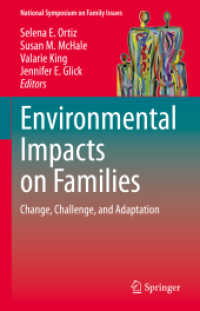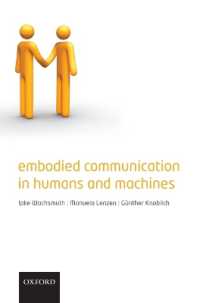- ホーム
- > 洋書
- > 英文書
- > Politics / International Relations
Full Description
This book describes the politically charged afterlife of Israeli electronics gathered by and processed in a cluster of rural Palestinian villages that has emerged as an informal regional e-waste hub. As with many such hubs throughout the global South, rudimentary recycling practices represent a remarkable entrepreneurial means of livelihood amidst poverty and constraint, that generates staggering damage to local health and the environment, with tensions between these reaching a breaking point. John-Michael Davis and Yaakov Garb draw on a decade of community-based action research with and within these villages to contextualise the emergence, realities and future options of the Palestinian hub within both the geo-political realities of Israel's occupation of the West Bank as well as shifting understandings of e-waste and recycling dynamics and policies globally. Their stories and analysis are a poignant window into this troubled region and a key sustainability challenge in polarized globalized world.
Contents
Acknowledgements; Part I. Positioning E-waste Hubs: 1. The emergence of e-waste hubs; 2. The west line e-waste economy; 3. Crude portrayals, crude proposals; 4. Co-creating e-waste hub futures; 5. Can tails wag the dog? a hub-driven approach to e-waste reform; Part II. Pathways and Predicaments: 6. E-waste burning: causes, consequences, and corrections; 7. The toxic elephant in the room; 8. Border frictions: formalizing the Palestinian e-waste industry?; 9. Open questions, opening futures; References; Index.








